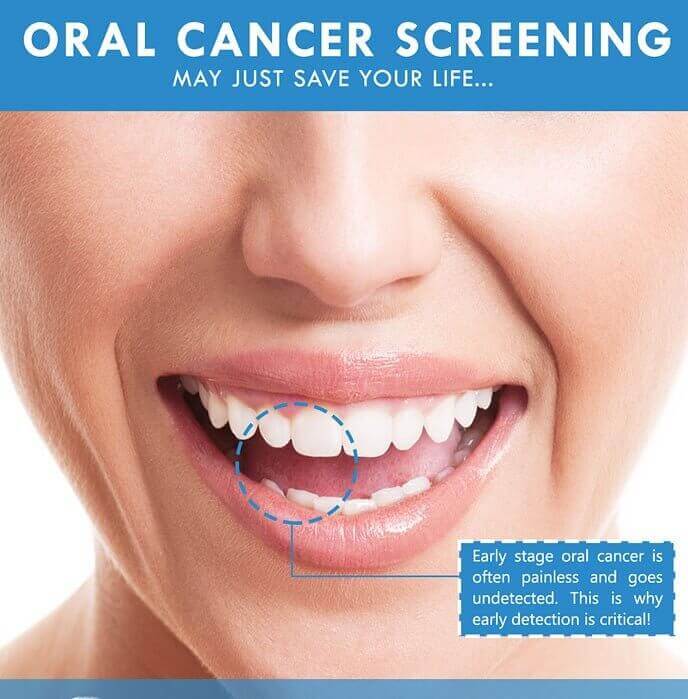Hello, Dr. Dayanayev here from Steinway Family Dental Center. We receive many questions online from you about oral cancer. Today, we're going to answer some of the most common questions, and hopefully, it will help you.
What is oral cancer?
Cancer usually involves cells that are abnormal, differing from adjacent cells. Under a microscope, they look different and function differently than the rest of the tissue.
What causes oral cancer?
Oral cancer is usually caused by some kind of trauma. There is something going on, and then the cells, instead of regenerating themselves or becoming copies of themselves, become slightly different. Once they change and grow, cancer develops further.
What are the early signs of oral cancer that you can look for yourself?
The best way is to see a dentist or dental hygienist who would look at it for you, but you can also examine yourself. Get familiar with your mouth and the tissue. Notice any changes in appearance or feel. If you have something protruding or a spot that never heals, consult your dentist.
What are the most common symptoms of oral cancer?
If you have a lesion that doesn't heal, it should be checked for cancer. Persistent discomfort in your mouth also warrants a check to determine if it's cancerous.
What does oral cancer look like in the early stages?
It's usually small, and something appears different from the surrounding tissue. If it persists for more than two weeks, it needs to be checked to determine if it requires treatment or a biopsy for diagnosis.
Is there a specific area where oral cancer is most likely to appear?
It typically occurs in the soft tissue. It rarely starts on a tooth, so if you have a hole in your tooth, it's most likely not cancer. However, always consult your dentist. X-rays can help detect early cancer formations inside the bone, making them essential despite concerns about radiation.
Can a lump in the gum be a sign of cancer?
It's possible. The best course of action is to see a dentist who can determine whether it is a cystic lesion, a temporary lump, or something that requires further examination or a biopsy.
What is the connection between HPV and oral cancer?
The HPV virus can cause cancer anywhere in the body, including the mouth. If diagnosed with HPV, speak with your dentist to assess your oral tissue for abnormalities.
How is oral cancer diagnosed during a dental visit?
We perform X-rays to detect abnormalities. The dentist will palpate the tissue and examine your lymph nodes and soft tissue for any irregularities.
What does an oral cancer screening involve?
We use a machine called a Velscope, which employs a specific light to detect abnormal lesions by identifying color differences in the tissue, indicating whether a biopsy is needed.
What are the current treatment options for oral cancer?
You would likely see a doctor, such as an oncologist or oral surgeon, to determine the appropriate treatment based on the size, age, and severity of the cancer.
How important is early detection of oral cancer in ensuring good outcomes from treatment?
The sooner cancer is detected, the easier it is to treat. Regular X-rays and checkups are essential for diagnosing early-stage cancer. Missing these screenings could lead to advanced-stage cancer, which is more challenging to treat.
I hope I have answered your questions today. If you have further questions or concerns about early cancer detection, please schedule an appointment with me. You can call us at (929) 238-9944 or request an appointment online at alldentalneeds.com. We can review your condition together and ensure your continued health.
It Is Important To Understand That Awareness And Early Detection Are The Best Way To Prevent Deaths From Oral Cancer.
Is Oral Cancer Serious?
Yes it is - it causes approximately 8000 deaths a year in the US.
Oral cancer, also known as squamous cell carcinoma, causes approximately 8,000 deaths each year in the United States. Oral cancer screening can lead to early detection and a better rate of cure. For this reason, our dental clinic provides examinations for oral cancer for our patients in Astoria, NY, Queens, and surrounding areas.
The dentist examines the teeth, gums, head, neck, and temporomandibular joints, or TMJ. In addition, the dentist looks at the tongue, gum tissue, lips, cheeks, and down your throat. This is done to look for lumps or other changes in the tissue. If there is any possible reason for concern, the dentist will discuss the findings with you.
It is important to note that changes in the mouth are not necessarily a sign of oral cancer. If pathology is found, we will show it to you and talk about the best way to proceed. Depending on the individual circumstances, it is possible that our dentist may recommend waiting a few weeks to see if there is an improvement in the area. If it does not improve, you will be referred for a biopsy consultation and possible oral surgery.
It is important to understand that awareness and early detection are the best way to prevent deaths from oral cancer. For this reason, it is important to contact us to schedule an appointment for an oral cancer screening, should you notice changes or have discomfort.


